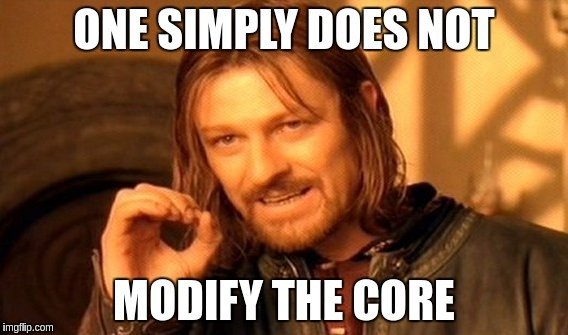Captain Hook
Arūnas Liuiza
Exp. level: Developer

I want to change
this one
simple thing(tm)...

General Rule
- If there is a possibility some particular piece of code will get an update from the original author, you should not touch it.
In the ideal world
- Do not modify WordPress Themes
- Use Child Themes
- Use Child Themes
- Do not modify WordPress Plugins
- Extend them via action and filter hooks
- Extend them via action and filter hooks
- Do not modify WordPress Core
- Extend it via action and filter hooks
Where do I put my
awesome
custom code?
Places for Custom Code
- Child theme;
-
functions.php;
- "My Custom Functions" plugin;
- Custom plugin;
/whois a child theme?
- It's a WP theme, based on another (parent) theme;
- You can change only the templates that You need to change;
- You can safely update parent theme;
- Introduced in WordPress ~2.7
/whois functions.php
- A file in WordPress theme, where You can* put custom code;
- Loaded with every page load;
- Very good for small presentation-centric/theme-specific snippets;
- Changes will go away if You ever change Your theme;
- 5.000 lines of code and 56 includes in functions.php
- a REALLY bad idea
/whois My Custom Functions?
-
A plugin in WordPress.org repository;
-
Allows* You to enter custom code via WP Admin dashboard;
- Your code stays active even when You switch themes;
- Uses eval() to run the custom code - a major security issue.
/whois a Custom Plugin
- A plugin You wrote ;)
- In it's basic form - just a .php file in wp-content/plugins;
- Needs a Plugin Header comment at the top of the file;
<?php
/*
Plugin Name: Health Check
Plugin URI: https://wordpress.org/plugins/health-check/
Description: Checks the health of your WordPress install
Version: 0.1.0
Author: The Health Check Team
Author URI: http://health-check-team.example.com
Text Domain: health-check
Domain Path: /languages
*/
?>So, how do I
extend
WordPress?
Ways to Extend WordPress
-
Pluggable functions;
-
Action hooks;
- Filter hooks;
/whois a pluggable function?
- A WordPress function that can be overridden by a plugin;
- Can be found in wp-includes/pluggable.php;
- Just define a function with the same name in Your plugin;
- Warning: some other plugin might do that before You do - potential for compatibility issues;
/whois a hook?
Design patterns


MVC
Event-driven
images by Tom McFarlin
So, /whois a hook?
- Hooks are the way WordPress allows 3rd party-developers to extend their event-driven architecture.
- Basically, hooks allow 3rd party developers to hook their own code to various events, that happen during WordPress pageload.
- WordPress hooks come in two different flavors - action hooks and filter hooks.
/whois an action hook?
Actions are points in the WordPress lifecycle that allow you to add, remove, or modify certain functionality.
- Tom McFarlin
You, as a developer, can hook a custom function to be executed at that particular point.
<?php add_action( 'wp_head', 'my_function' ); ?>This line will execute my_function when WordPress is printing it's code in the <head> part of HTML document.
An Example
<?php
add_action( 'wp_head', 'my_function' );
function my_function() {
echo '<!-- hello! -->';
}
?>The above code will print a '<!-- hello! -->' comment in the <head> part of any WordPress website.
/whois a filter hook?
Filters, on the other hand, are points in the WordPress lifecycle in which you can add, remove, or modify data.
- Tom McFarlin
You, as a developer, can hook a custom function to modify that piece of data.
<?php add_action( 'the_title', 'title_filter' ); ?>This line will make WordPress to pass article title to title_filter function and use the return value whenever WordPress prints an article title.
An Example
<?php
add_filter( 'the_title', 'title_filter' );
function title_filter( $title ) {
$title = $title . ' :)';
return $title;
}
?>The above code will make WordPress display a ':)' at the end of every post/page/menu item title.
Priority
- When You are hooking a function, you can also set it's priority.
- It will control the order of execution.
<?php
add_filter( 'the_title', 'function_1', 10 );
add_filter( 'the_title', 'function_2', 9 );
add_filter( 'the_title', 'function_3', 90 );
?>Functions will be executed in this order: function_2, function_1, function_3
Accepted Arguments
- Some hooks pass additional arguments to the hooked function.
- You can tell how many arguments Your function expects to get.
<?php
add_filter( 'the_title', 'function_1', 10, 2 );
add_filter( 'the_title', 'function_2', 10, 1 );
add_filter( 'the_title', 'function_3', 10 );
?>function_1 will receive 2 arguments (post title and post ID), while function_2 and function_3 will only get post title.
Note: filter functions will always receive one argument.
Where can I hook?
Where can I Hook?
Short answer - everywhere :)
Long answer - there are around 2000 different action/filter hooks in current WordPress codebase (and growing with every version).
And if lists fail You, You can always just look at the relevant part in WordPress code.
An awesome plugin by John Blackbourn
Top Menu > Hooks
Main action hooks in their execution order;
Together with all the functions that are attached to those hooks;

How can I
trigger
a hook?
Adding Hooks to Your Code
You can also add hooks to Your own code, to make it extendable and/or leverage features of other plugins or WordPress Core.
<?php
// trigger `wp_head` action
do_action( 'wp_head' );
// trigger `the_title` filter
$title = apply_filters( 'the_title', $title, $post_id );
?>Making Your Own Hooks
Finally, You can also create Your own custom hooks, specific to Your code. Just use Your own hook name.
<?php
// trigger `arunas_action` action
do_action( 'arunas_action' );
// trigger `arunas_filter` filter
$data = apply_filters( 'arunas_filter', $data );
?>Recap
-
Do not modify code maintained by other people:
- WordPress Core, themes & plugins.
-
Extend it using:
- Child themes;
- Pluggable functions;
- Action and filter hooks.
- Best place for custom code:
- Child theme for theme-specific code;
- Custom plugin for everything else;
Recap (continued)
- Action hooks allow You to modify functionality;
- Filter hooks allow You to modify data;
- Remember, you might be not the only one hooking in;
- Use hook triggers to make Your own code extendable;
- You can create Your own hooks!
There always is
a hook
for that!
Questions?
Captain Hook
By Arūnas Liuiza
Captain Hook
- 3,037




